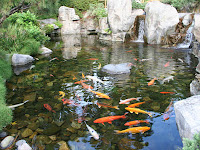5 Key Factors for Green Pond Water
By Clifford WoodsAlgae overgrowth can have disastrous consequences on the well-being of our ponds. Below are five factors that contribute the algae development and how it can be stopped.
#1: Excessive Fish
If this sounds like your situation, then immediately limit the volume of fish or add to the size of your organic filtration system. Keep in mind that fish grow in size and in quantity, therefore the scale your organic purification system which you believed might be the right size in the beginning, may not be the proper size for your pond now.
#2: Seasonal Changes
It is the start of the spring time or the later part of the fall when the pond encounters its largest change in the temperature of the water and biological bacteria development. If this is the situation, try to be calm and give your pond a few additional weeks.
Every single pond takes around four to six weeks in the beginning of the season to discover its new environmental equilibrium. When this occurs, the pond water will likely be green in appearance. In fact, you can count on it. At any time you increase the water level of your pond during the year, your pond is likely to turn green as well.
Simply add the most appropriate beneficial microorganism’s solution to provide your pond with good aeration and stay patient. Bear in mind, it will require several weeks, not just a couple of days. Never persistently drain and refill your pond because you will be consistently altering its ecological stability that it's striving to achieve – so give it a hand, be patient.
#3: Accumulation of Organic Matter
For those ponds that have more organic substances, like dead leaves, fish wastes, muck, sludge, and so forth, in them than the amount of beneficial microorganisms in your filtration system where beneficial microorganisms reside and flourish, you may either have to add to the size of your organic filter or increase the total quantity of beneficial microorganisms in your pond.
You can do this by one of two ways; basically increase the size of your filter of add more beneficial microorganism to your pond. You need to be incorporating beneficial microorganisms on a regular basis into your pond in any case.
#4: Too Much Water
Remain calm with your pond as it sets up its new environmental equilibrium. This often completes in about four to six weeks following the previous time you have added extra water. Whenever you add more water, you cause a difference in the pond which causes new algae to prosper and green water to occur. Simply have patience and increase the amount of beneficial microorganisms you add to your pond.
#5: Other Factors That Could Be Causing Algae and Killing the Beneficial Microorganisms in Your Pond
If you are introducing fresh water into your pond on a regular basis; quit doing so now. Allow the pond to find its new environmental stability. In the case that you are including beneficial microorganisms to it, but not disabling your UV clarifier or UV sterilizer, then make sure to turn it off no less than three to four days just prior to when you added the bacteria to ensure that the microorganisms have had an opportunity to attach themselves to the surface area within your pond or organic filter.
A few chemical compounds put into the pond can also be the reason for precisely what is wiping out your beneficial microorganisms. If that's the case, invest in an organic algaecide that contains beneficial microorganisms. You'll be killing two birds with one stone with such a solution as you will be eliminating algae as well as replenishing your pond with bacteria that will improve the pond's overall health.
* * *
Clifford Woods is the CEO of Effective Environmental Services and Organic Environmental Technology.
We brew Beneficial Microorganisms that eat toxins in the environment and offer Natural Organic Solutions.
_ _ _
Sources
"Pond Magician"; Effective Environmental Services
"Pond Maintenance 101"; Awesome Library
"Pond Care"; Planet Natural
"Ponding 101"; 123Ponds
"Seasonal Pond Maintenance Checklist"; Doctors Foster and Smith




